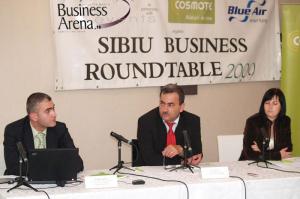Sibiu businesses complain about bureaucracy
Although Sibiu is one of the most active regions in attracting European funds, the local business community has expressed its dissatisfaction with the difficult bureaucratic stages that companies must complete to access the funds. The effects of the economic crisis and banks' tighter lending policies have determined many business people to look towards European funding with increased interest. However the bureaucratic quagmire and slow processing can lead to the demise of many companies relying on such funds, according to the participants to Sibiu Business Roundtable 2009, organized at the Continental Hotel in partnership with Blue Air and Cosmote Romania. Ioan Banciu, vice president of the Sibiu County Council, expressed his support for the local business people. "The system is extremely cumbersome for businesses," he agreed, adding however that the European funds continued to represent a viable solution for companies, as bank lending was still tight.
The participants also criticized the slow pace of development in infrastructure and its effects on economic development. In her speech, Adriana Muresan, head of the Programs and Public Relations department, Regional Development Agency - Center, emphasized that Sibiu county was quite efficient in accessing European funds. She specified that the regional operational program had attracted 217 projects by June 15, their total value amounting to 600 million Euro. "Even though the number of projects is quite high, more than half of them have been rejected in different evaluation stages because they were not properly prepared to meet eligibility terms," Muresan said. Referring to the business prospects in the region, Ioan Banciu, vice president of the Sibiu County Council, indicated that the industrial and real estate sectors were particularly attractive, offering opportunities for new investments. "A new industrial area was created in Sibiu in 2003, the so-called west industrial area, having a favorable location in the vicinity of the airport. Other industrial hubs include the Sura Mare industrial park, Talmaciu, Medias and now a new industrial park is to be opened at Copsa Mica. Many foreign investors arrived in the region in 2003 - 2004, focusing on automotive parts production." On that note, Banciu pointed out that another important development for the region was the modernization of the local international airport. "We made a 277 million lei investment, finalized in 2009, creating the best runway in Romania." Asked whether a cargo terminal would be built, he said: "Unfortunately, there will be no cargo terminal on short and medium term because we have no available land and the Country Council cannot afford another loan at this stage, after the previous 40 million Euro one. So I don't think we will have a cargo terminal at the Sibiu Airport for another four or five years. Although the city of Sibiu is still attractive to investors, the effects of the economic crisis can be seen in the higher unemployment rate. While at the end of 2008, the unemployment rate stood at 3.2 per cent, now this indicator reached 5.7 per cent, the same level recorded in 2005, according to Gabriela Teodorescu, director with the Country Labor Agency. While cost-cutting is a major focus for most companies, Cosmote Romania has devised a strategy designed to help clients reduce communication costs, according to Marius Bene, Head of Business Sales Cluj Region, Sales & Customer Care Division, Cosmote Romania. "Firstly, we try to improve the efficiency of the packages you are already using, then we create the groups, whose members benefit from unlimited, free-of-charge calls within the group, and we also allow clients to keep costs permanently under control." Bene also indicated that Cosmote's portfolio is divided into three large categories: Cosmote Business, Cosmote and Romtelecom convergent and Cosmote Corporate. With 6.1 million subscribers, the company hald a market share of 21 per cent at the end of last year. "Cosmote estimates a market share of 25 per cent for the end of 2009," he said. Speaking of the aspects that give the company an edge over the competition, Bene said: "Our offers are easy to understand and we have solutions for everyone's communication needs." On a different note, Angela Bala, route manager Romania & UK, Blue Air, voiced a request for the County Council to offer financial support for the promotion of Sibiu in all the destinations covered by the airline from the Transylvanian city. On the occasion, she also spoke about the company's activities and services: "We offer a series of services to our clients. They benefit from low prices, free-of-charge name changes on tickets, and we are always trying to address their requests in terms of services and new routes." Speaking about his company's development plans, George Visoiu, sales, marketing and audit counselor with Amylon, said there were plans for a full relocation of production activities from Cluj to Sibiu. "Our objective is to relocate the entire production from Cluj to Sibiu by 2010." He added: "We target a turnover of one million Euro per month this year." Emphasizing the importance of investments in the IT sector, Adrian-Stefan Lelutiu, sales consultant with the IT solutions supplier Eytro Romania, member of the Swiss group ISC, said companies had blocked their investments in IT systems. "The availability of European funds could help companies invest in IT systems." On a more optimistic note, Maria Stefanel, administrator, Assa Grup, said her company had not been affected by the crisis. "Fortunately there is still work to do. Perhaps we will be touched by the crisis in passing, when we are due to get paid by our main clients, different town halls. So far construction and design works are still in demand in Sibiu and in Romania as a whole." As lending restrictions make financing difficult, the guarantees offered by the National Loan Guarantee Fund for SMEs (FNGCIMM) could represent a solution for companies in need of funding, according to Aurel Pau, financial analyst with FNGCIMM. "Business people and banks in Sibiu area have been more cautious those in other areas. Thus our activity in the region, issuing guarantees for SMEs, had a slow start, our representative office here being opened in 2006
S-ar putea să îți placă:
COMENTARII:
Fii tu primul care comenteaza




